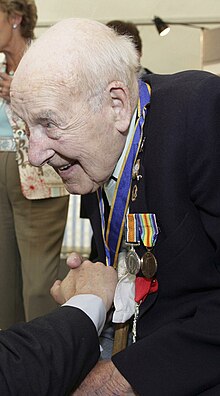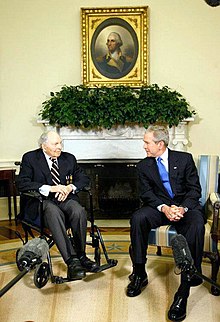Wikipedia:Wikipedia Signpost/2011-10-10/WikiProject report
The World's Oldest People



This week, we spent some time with WikiProject World's Oldest People, a project dedicated to improving biographies and lists of notable centenarians and supercentenarians. The project got off to a rocky start in March 2008 when its founder, an enthusiast from Yahoo's World's Oldest People discussion board, attempted to affiliate the WikiProject with the Gerontology Research Group. After years of edit warring, hostile debates, deleted page histories, removed images, AfDs, and arbitration, the project finally found peace and has accumulated six Good Articles and one Featured Article. The project supplements the guidelines of its parent, WikiProject Biography, with some notes on notability, sourcing, and the treatment of biographies of living people within the project's scope. We interviewed two project members, SiameseTurtle and David in DC, along with independent contributor The Blade of the Northern Lights.
What motivated you to join WikiProject World's Oldest People?
- SiameseTurtle: I was involved in researching the World's oldest people before joining Wikipedia. I got involved because I wanted to help spread the information to the public, as there are many longevity myths that appear even in the most reputable news sources. Wikipedia has a wonderful way of a lot of information in a simple way.
- David in DC: I was troubled by the poor sourcing, and dubious notability, of many articles in the longevity suite. It was also - fairly ubiquitously - ignoring, flouting or openly deprecating common Wikipedia norms (only rare edit summaries, WP:WALLEDGARDEN, WP:OWN). I felt it needed input from wikieditors who were not longevity experts and hobbyists, to try to keep the project from turning Wikipedia into a webhosting service for the Gerontology Research Group and the World's Oldest People Yahoo group. As I got more involved, I became fascinated by the topic of human longevity and how the normal human lifespan has increased so radically. Notable long-lived people in Shakespeare's time would have been 50 or 60 years old. Today, that lifespan is remarkable for being short.
- The Blade of the Northern Lights: Though I'm not actually a member, I have been very involved with the WikiProject from around November. I saw accusations of a walled garden mentality, and I thought I could help out with them. As I got a little further in, I too became extremely interested in longevity. The main catalyst came when in real life, I started taking a senior-level college class on World War I, and Frank Buckles, the last American veteran from WWI, was close to turning 110; this spurred me on to stay involved in the topic, and I have to this day.
How does the project handle articles about disputed or missing records of a person's longevity?
- SiameseTurtle: In the case of missing records, the people's ages will not be validated by an international organisation, such as the Gerontology Research Group. They're unlikely to have an article themselves without substantial news coverage (eg. Sahan Dosova). Without proof, they are treated as claims to longevity. In terms of people who are disputed, this is slightly different. Disputed in this context means that a person's age was originally thought to be valid, but new information casts some level of doubt on that age. Or it may be that the specific date of birth is unknown, perhaps due to lack of historical records (eg. Moses Hardy). Obviously these are sensitive areas, so we state the facts. However to be scientific, we do have to go with the validated date of birth. Shigechiyo Izumi was originally thought to have lived to 120 - the oldest man ever. However Japanese researchers later discovered that he was probably named after an elder sibling who died young. The case was retracted last year.
- David in DC: It relies on "experts" who make these decisions off-wiki and self-publish them on a set of Gerontology Research Group web pages.
- SiameseTurtle: These tables are also published on a regular basis in the peer-reviewed journal Rejuvenation Research. Due to the dynamic nature of the subject, with birthdays and deaths happening constantly, the tables are also published online so they can be updated more frequently, as David in DC mentions.
How is notability determined for articles about the world's oldest people? How frequently does the project deal with disagreements and misunderstandings about notability?
- SiameseTurtle: Notability is usually determined using multiple birthday reports. But it often depends on how much information those articles have. So it can take many years to gather enough information to write an article. And of course, they have to stay alive, which is a big obstacle since around 50% die each year. There are often disputes over what is deemed notable. Some articles might be borderline and might be merged into national lists of supercentenarians (eg. List of British supercentenarians). However, we recently sorted through many articles to see whether they met the general notability guideline or not. In short, it really depends. Sometimes there are many disagreements at once, and at other times very few at all.
- David in DC: The sorting is a long-term project. Notability is one issue, but reliable sourcing problems still abound.
- The Blade of the Northern Lights: To expand upon what David in DC says, there are a few people who straddle the line of notability. It tends to be a bigger problem with people from smaller countries where less attention is given to longevity, so while an American like Walter Breuning will have a lot written about him, someone from Belgium will probably have less, which has led to a few very contentious AfDs. Last year around November/December, some of the members of the Wikiproject (with some outside assistance) went to cut through the large walled garden that had accumulated, and while most of the debates came to a definitive conclusion there are still a few on which no consensus has developed; these are primarily on people in countries with less consistent coverage on this topic.
The project is home to one Featured Article, one A-class Article, and five Good Articles. Have you contributed to any of these articles? What are some challenges to getting an article on a supercentenarian up to FA or GA status?
- SiameseTurtle: I have contributed to Henry Allingham and Jeanne Calment's articles. The main challenge is that most supercentenarians are not famous before 110. All the information about them has to be garnered from news articles, which are often quite similar year on year. They generally give patchy information about their past life (where they were born, what their job was, where they lived), and what they do now, and what they believe to be the reason for their longevity. Most of the best articles are of people who served in World War One, because of the amount of press attention they received.
- David in DC: I've contributed to many articles. I've dealth with Jeanne Calment on a few lists but I don't know if any stand-alone articles I've contributed to are FA, A or GAs. The longevity tables are shaded with legends for categories like "Verified", "Unverified", and "Disputed". These categories largely mirror the information on the GRG websites.
Are images of the world's oldest people difficult to obtain? What lessons have you learned from acquiring the images currently used in articles?
- SiameseTurtle: It's very difficult to obtain uncopyrighted images. The main reason is that very few people get to visit these people. They don't really get out very often, so they are rarely seen publicly. In addition, most photographs come from birthdays and it's mostly just family and the press who are invited. So nearly all of the images of supercentenarians are copyright (and also very recent), which is an issue when trying to get images for Wikipedia.
What are the project's most pressing needs? How can a new member help today?
- SiameseTurtle: I would say the biggest issue is a lack of detail in Wikipedia articles. The newspaper articles are out there (which may or may not be in another language), but many members do not have the time, or may spend their time on Wikipedia updating the many lists we have. Thanks to the digitisation of many newspapers, it has been possible to lengthen articles such as Margaret Ann Neve and John Mosely Turner, who both died long ago. It really shows to me that articles can be rescued, it often just need a little bit of effort. I would also say that images are a real problem. Studying the World's Oldest People is a very human thing, and it's a shame that we do not have as many images as we would hope.
- David in DC: The project needs many more generalist, wikipolicy-wise editors to help it reach consensus about sources and notability.
- The Blade of the Northern Lights: I think the project would do good to encourage some more dispassionate editors to get involved in the topic area; notability to extremely passionate people may not jive with Wikipedia's notability guidelines, and the more acrimonious debates tend to occur when the two intersect. Sourcing is also an issue for some (though certainly not all) articles as well. Part of that is simply a lack of diversity in third-party sources reviewing such material (the Gerontology Research Group is the one most frequently used), but at the moment there are too many articles with justified refimprove tags in the topic area.
Anything else you'd like to add?
- SiameseTurtle: The WikiProject does not encompass all people who research the World's Oldest People, just those who are regulars on Wikipedia. We do have many people from countries all over the world who help contribute to the work we do here. Fortunately that also means that we have a very broad view on our project as we use articles from everywhere - not just the English-speaking world. I think that makes our group very encompassing and thorough in what we do.
Next week, we'll see where some of the world's oldest people might have lived. Until then, continue to read about the good old days in the archive.



Discuss this story